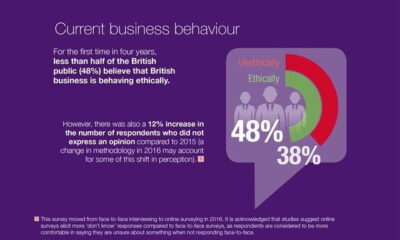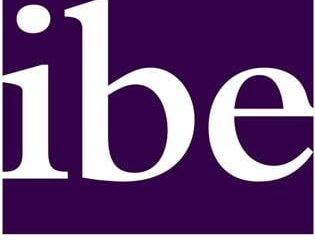

Economy
Concerns and Ethical Lapses, 2015
The latest briefing from the Institute of Business Ethics analyses the major business ethics concerns and ethical lapses from 2015 which were recorded in the IBE’s ‘media monitoring’. In 2015, 376 stories related to business ethics issues were recorded.
- Concerns about executive remuneration and the mistreatment of employees appear to have received more press coverage in 2015 than in 2014.
- The prominence of the finance sector in the media decreased in 2015, although it remains the most reported on industry.
- Stories related to both professional services providers and media and entertainment were found to be more prominent in 2015 than in 2014.
As in 2014, the Finance sector received the most news coverage in 2015 – but fewer stories reported this year (97 in 2015, 181 in 2014) and the gap between it and other sectors has become smaller. This is consistent with recent IBE analysis which observed that in Britain since 2012 the business ethics landscape has become less dominated by scandals associated with the financial crisis, and new issues have drawn public attention to a wider variety of sectors. Fraud was the most common form of wrongdoing present in the media in relation to the finance sector in 2015, with stories split between allegations of financial crime committed by organisations and individuals or groups defrauding their employer. This sector gained the highest press coverage about mistreatment of customers. Utilitycompanies followed, criticised especially for allegedly inadequate customer service and management of complaints.
Retail continues to be the second most covered industry with 62 reported ethical lapses and concerns. The main issue was the mistreatment of stakeholders, particularly staff and suppliers. Supply chain issues also featured prominently: late payments to suppliers and abuse of power were the most pressing concerns. Cases of human rights breaches, such as slave or child labour, in the supply chains of retail companies were also reported.
The majority of the news stories of alleged misconduct involved big corporations, with 12 of the 20 most frequently mentioned companies currently listed in the FTSE 350 Index. According to their company websites, 80% of these 20 companies have adopted an explicit set of values and about three in four have a publicly available code of ethics (or similar document). This suggests that although both of these are important promoting ethical behaviour, on their own they are not sufficient. Companies need to take further steps and ensure that their values are effectively embedded into their business, to minimise the future risk of such stories featuring in the news.
Sector to watch: There were 31 stories involving technology companies, making this sector the third most reported on in 2015. Accounting for 8% of the stories, it is on an upward trend when compared to 2014 and this reflects the increasing prominence of technology companies and the new ethical risks that have emerged in this sector. Nearly a quarter of ethical lapses in this sector (23%) involved competition practices. The ethical dilemma of addressing both the needs of privacy and the requirements of openness clearly presented a concern, while the new ethical issues posed by the use of Big Data appear to have exacerbated the problem. About a fifth of stories in this industry (19%) involve these contrasting demands.

Continue Reading

 Features11 months ago
Features11 months agoEco-Friendly Cryptocurrencies: Sustainable Investment Choices

 Energy11 months ago
Energy11 months agoThe Growing Role of Solar Panels in Ireland’s Energy Future

 Energy10 months ago
Energy10 months agoGrowth of Solar Power in Dublin: A Sustainable Revolution

 Energy10 months ago
Energy10 months agoRenewable Energy Adoption Can Combat Climate Change




























